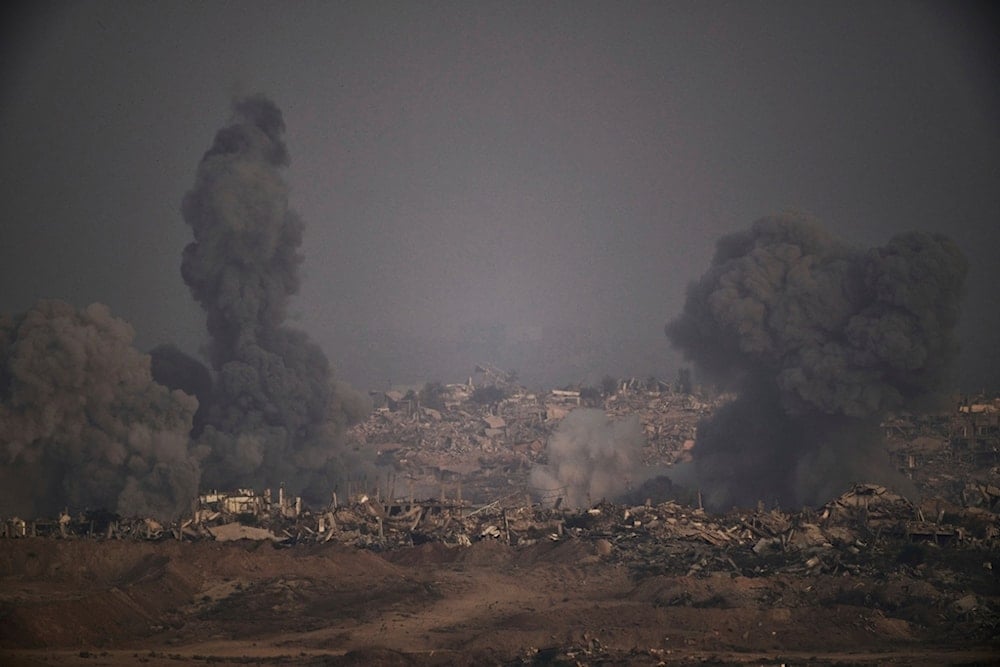Stephen Walt in Foreign Policy: The 'New Middle East' is a myth
Stephen Walt argues that despite recent upheavals, the Middle East remains unstable due to deep-rooted injustices, weakened resistance forces, shifting power centers, and a still-unresolved Palestinian issue.
-

Smoke rise to the sky following an Israeli airstrike in the northern Gaza Strip as seen from southern occupied Palestine, Saturday, July 26, 2025 (AP Photo)
Writing for Foreign Policy on Thursday, columnist Stephen M. Walt poured cold water on recent claims heralding the dawn of a "new Middle East," arguing that while the region has undergone dramatic changes, the fundamental causes of instability remain deeply entrenched.
Walt, a renowned realist scholar, dismissed the idea that regional milestones, from the Six-Day War to the US invasion of Iraq and the Arab Spring, have ever truly transformed the underlying dynamics. "How many times have we heard that?" he asked, warning against overestimating recent shifts triggered by events such as the October 7 operation and "Israel's" subsequent onslaught on Gaza.
According to Walt, the most significant recent development is the "dramatic weakening of the 'Axis of Resistance,'" which includes Iran, Hezbollah, Hamas, Iraqi factions, Ansar Allah, and formerly the Assad regime. He noted that while "Israel" and the US have aggressively targeted this coalition, through airstrikes in Yemen, Syria, and even Iran, none of its elements have been fully eradicated. "Each is substantially weaker now than a few years ago," he wrote, "but all remain stubbornly defiant."
Power Shift
The columnist also identified a shift in Arab power centers, away from Egypt and Iraq and toward Gulf countries like Saudi Arabia and the UAE. With Egypt "an economic basket case," Walt observed that the Gulf monarchies are asserting themselves diplomatically.
Walt contended that Russia's regional clout has eroded in the wake of Syria's political collapse and the costly war in Ukraine. "Moscow could not prevent Assad's collapse," he wrote, underlining the limitations of Russia's influence despite Tehran's support for the Kremlin in its conflict with the West.
The United States, meanwhile, remains deeply enmeshed in the region despite frequent pledges to pivot toward Asia. Walt described Trump's recent air campaign against Iran, aimed at destroying its nuclear infrastructure, as a clear sign that Washington has not disengaged. "Plus ça change; plus c'est la même chose," he quipped.
Shifting Allegiances
While "Israel's" brutal war on Gaza has pleased hawkish factions in the US, Walt noted a steep decline in global and domestic support. Quoting Israeli diplomat Alon Pinkas, he wrote that "60 percent of Americans now disapprove of Israel's campaign in Gaza," while a majority see the occupation in an unfavorable light. Even within the Republican Party, once a bastion of unwavering pro-Israeli sentiment, dissent is growing. "When you've lost the likes of Tucker Carlson, Steve Bannon, and diehard Trumpian Rep. Marjorie Taylor Greene," Walt wrote, "you know the ground is shifting."
Internationally, countries such as France, the UK, Canada, and possibly Australia are moving toward recognizing Palestinian statehood, reflecting a broader global backlash against Israeli policies.
Read more: After months of backing war crimes, West demands end to Gaza genocide
Yet Walt insisted that despite all this, the Middle East remains what it has long been: a volatile arena of competing powers, foreign interventions, and deep injustices. He warned that the failure to resolve the Palestinian issue, where millions remain stateless and disenfranchised, will continue to generate unrest. "We are no closer to a political resolution to the Palestinian issue and in all likelihood further away," he concluded.
Enduring Instability
Until the region sees a balance of power rooted in justice and political rights, Walt argues, instability will persist. "A stable regional order will require a more even balance between power and legitimacy," he wrote, adding that legitimacy depends on "a measure of justice, fairness, and the provision of political rights."
For now, he remains unconvinced by talk of transformation. "The 'new' Middle East," Walt warned, "will be a lot like the old one."

 4 Min Read
4 Min Read










